【精编】六年级英语上册Unit6Goingtoschool课件1(牛津上海版一起)25
上海市小学六年级第一学期英语(牛津上海版)教材教案课堂单词记忆课件(例句版)Unit 6 Going to school

来源:lot源自中古英语的hlot,意为抽签用的木片。
词组:a lot of cars 很多车 a lot of sheep 一群羊
例句:They make a lot of money. She gets a lot of information.
来源:源自古英语的hwenne,意为何时。
例句:When are we leaving? When are you going home?
词组: five star hotel 五星级宾馆 stay at/in a hotel 住宾馆
例句:I’ve booked the flights and the hotel. The hotel is now open to guests.
构成: ad+vert+ise+ment=advertisement
构成:fer+ry=ferry fer-: 词根:带来 -ry: 名词后缀 “带来带去的东西”→“渡船”
词组: by ferry 乘渡船,乘渡轮
ferry terminal 渡轮码头 例句:When does the next ferry leave? You can cross the river by ferry.
来源:源自中古英语的fewe;最初源自古英语的feawa, 意为少,少的。
词组:a few minutes 几分钟 a few of people 几个人
例句:He found a few coins in the car. I only know a few Chinese characters.
提示:本演示文稿采用Microsoft office PowerPoint 2013 制作,PPT动画特效在其他软件播放可能出现失真。
2017六年级英语上册 Unit 6 Going to school课件2 牛津上海版(一起)
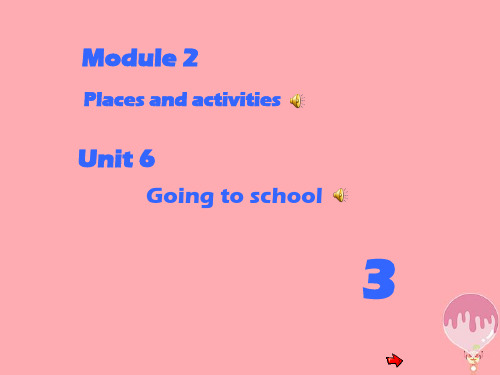
Places and activities
Unit 6
Going to school
3
Piggy Bank
Read and answer
Look and read
About you
Look, ask and answer
Look and learn
Read and answer
Joe’s journey to school
about 15 minutes
more than an hour
about 20 minutes
about half an hour
Joe
Miss Hong
Sally
May
Listen and write
• The pictures below show the neighbourhoods of the children and Miss Hong. Listen to the conversation and write the correct names under the pictures. Sally Joe May Miss Hong
Write
• Choose one of your classmates’ journey and write about it.
__________’s journey to school _______ always leaves his/her home at … and arrives at school at …. It takes him/her about … to get to school. When he/she is on the bus, he/she sees … When … When … It is a long/short journey to school.
Unit+6+Going+to+school+单元复习课件-英语六年级上册(牛津上海试用本)

【知识拓展】by ferry 乘船
单词解析
3. advertisement n.广告advertise v.通知,为 .. 做广告 advertising n.广告业
For example
【例句】 There are many advertisements around us .我们周围有 很多的广告。
重要句型分析
★on one ' s way (to)为 在某人去某地的 路上“。 例如: on my way to the park 在我去公园的路上
on her way to the factory 在她去工厂的路上
on his way to the cinema 在他去电影院的路上
重要句型分析
B: About ten minutes.
A.How long
B.How often
B.How soon
C .How far
( )3. It will take you about an hour
get to the airport.
A. to B. on
C. off
D. in
( )4. I'd like to read books when I am
重要句型分析
★下面介绍 by 的几种用法: (1)表示搭乘交通工具:by train(乘火车);by taxi(乘出租车) ,例如:We can go to Beijing by plane.我们可以乘飞机去北 京. (2)表示传达,传递的方式: by letter(用信件);by radio(用无 线电), 例如:I like to listen to music by radio. 我喜欢用无线电听音乐 。 (3)by+动名词:表示依靠 .....为生 例如:I get my living by teaching English . 我以教英文为生。 (4)最迟在……之前",到……时候为止” 例如:I will come back by six o‘clock. 点以前回来。 (5)表示动态的位置,解释为 经过”。
六年级英语上册Unit6《Goingtoschool》教案牛津上海版(一起)(最新整理)
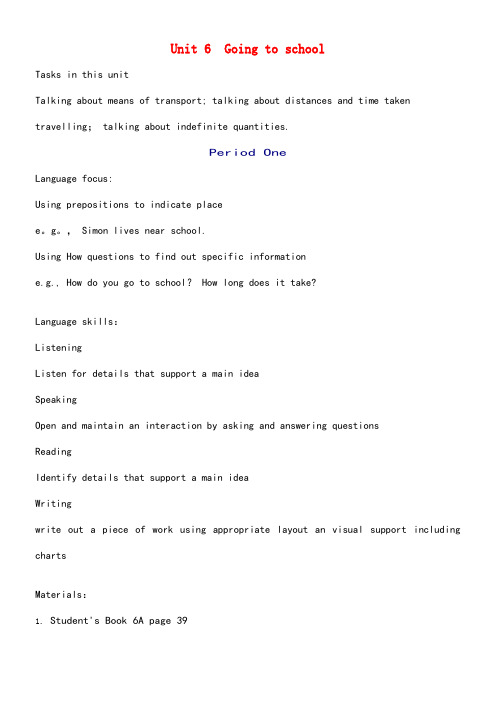
Unit 6 Going to schoolTasks in this unitTalking about means of transport; talking about distances and time taken travelling; talking about indefinite quantities.Period OneLanguage focus:Using prepositions to indicate placee。
g。
, Simon lives near school.Using How questions to find out specific informatione.g., How do you go to school? How long does it take?Language skills:ListeningListen for details that support a main ideaSpeakingOpen and maintain an interaction by asking and answering questionsReadingIdentify details that support a main ideaWritingwrite out a piece of work using appropriate layout an visual support including chartsMaterials:1.Student's Book 6A page 392.Workbook 6A pages 35 and 383.Cassette 6A4.Cassette playerPre—task preparationReview:near/far away from。
Give an example in relation to your school: e.g。
六年级上册英语课件-Unit 6《Going to school》|牛津上海版(一起) (共13张PPT)

bus.
C: I see trees, shops and gardens when I’m
on the bus.
D:… E:… F:… G:…
• In pairs, talk about what you see on your way to school.
Welcome to Hannah’s class!ferry lig来自t railtemple
kindergarten
an advertisement board
housing estate
department store
a few
a lot of
Listen and match
Things trees
I see a few parents, some teachers and a lot of students when I’m walking to school.
I see a lot of some a few
____ when I am _________.
in the department store
flowers
grass
supermarkets housing estates shops
schools
advertisement boardstemples
department storesgardens
offices
restaurants
factories
banks
kindergartens police stations
some
walking to school.
六年级英语上册 Unit 6《Going to school》教案1 牛津上海版(一起)
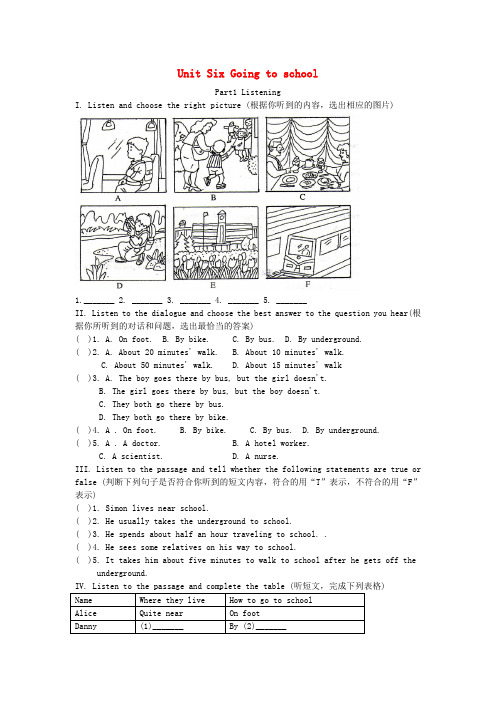
Unit Six Going to schoolPart1 ListeningI. Listen and choose the right picture (根据你听到的内容,选出相应的图片)1._______2. _______3. _______4. _______5. _______II. Listen to the dialogue and choose the best answer to the question you hear(根据你所听到的对话和问题,选出最恰当的答案)( )1. A. On foot. B. By bike. C. By bus. D. By underground.( )2. A. About 20 minutes' walk. B. About 10 minutes' walk.C. About 50 minutes' walk.D. About 15 minutes' walk( )3. A. The boy goes there by bus, but the girl doesn't.B. The girl goes there by bus, but the boy doesn't.C. They both go there by bus.D. They both go there by bike.( )4. A . On foot. B. By bike. C. By bus. D. By underground.( )5. A . A doctor. B. A hotel worker.C. A scientist.D. A nurse.III. Listen to the passage and tell whether the following statements are true or false (判断下列句子是否符合你听到的短文内容,符合的用“T”表示,不符合的用“F”表示)( )1. Simon lives near school.( )2. He usually takes the underground to school.( )3. He spends about half an hour traveling to school. .( )4. He sees some relatives on his way to school.( )5. It takes him about five minutes to walk to school after he gets off the underground.IV. Listen to the passage and complete the table (听短文,完成下列表格)V. Listen to the passage and fill in the words you hear(根据你听到的词语填空) The students in Mr. Brown's class are very (1)_______. Bill, (2)______ and Jane are working on computers. Mary is (3)______ up her hand. Wang Lin and Tom are drawing a (4)_______ . Bob is reading books by (5)______ .Part 2 Vocabulary and GrammarI. Choose the best answer (选出最恰当的答案)( ) 1. It takes me half _____hour to get to school.A. anB. aC. theD. /( )2. Alice goes to school _____bus and comes back _____foot.A. by.. .byB. by.. .onC. on.. .onD. on...by( )3. It takes me more than 2 hours to get to my friend's home. He lives _____here.A. quite far away fromB. nearC. quite nearD. not too far away from( )4. There is _____advertisement board in front of my flat.A. aB. anC. theD. /( )5. The film will start _____eight thirty.A. onB. inC. atD. for( )6. The boy takes an underground, _____walks for ten minutes to get home.A. thanB. thenC. afterD. /( )7. It usually _____Peter an hour to get to school.A. takeB. takesC. is takingD. took( )8. ______time do your family members usually spend travelling in a day?A. How manyB. How oftenC. How longD. How much( )9. - ______does it take you to get to the supermarket?-About 10 minutes.A. How manyB. How muchC. How longD. How often( )10.I like having lessons in a ______.A. schoolB. restaurantC. hospitalD. department store( )11. She saw ______new students at the school gate this morning.A. a lotB. a littleC. a groupD. a few( )12.1 will visit a friend when I _____free tomorrow.A. shall beB. am going to beC. will beD. am( )13. Would you like ______fishing this weekend?A. goB. goingC. to goD. goes( )14. _____ helps to keep the city safe.A. A shop assistantB. A cookC. A firemanD. A policeman( )15. What did you see on your way _____?A. to thereB. cinemaC. back homeD. to homeII. Choose the word or expression which is closest in meaning to the underlined part in each sentence (选择与下列各句中划线部分内容意思相近的单词或短语)A. fifteen minutesB. at weekendsC. walksD. do...wantE. see filmsF. a lot of( )1. Simon goes to school on foot.( )2. My grandma takes a walk for a quarter of an hour every day.( )3. Do you often go to the cinema?( )4. Where do you usually go on Saturdays and Sundays?( )5. Peter, would you like to work many hours in a day?( )6. You can see much traffic in streets in rush hours.III. Complete the sentences with the given words in their proper forms (用括号中所给单词的适当形式完成下列句子)1. There are many _______ on the Huangpu River. (ferry)2. _______ to many places is very interesting. (Travel)3. Have you been to any _______ in Bangkok? (temple)4. My _______ estate is near my school. (house)5.1 can see a lot of shops when I am _______ to school. (walk)6. Cherry doesn't like to be a cook because she doesn't like ______. (cook) IV. Rewrite the following sentences as required (根据所给要求,改写下列句子。
牛津上海版六年级上册英语 Unit 6 Going to school
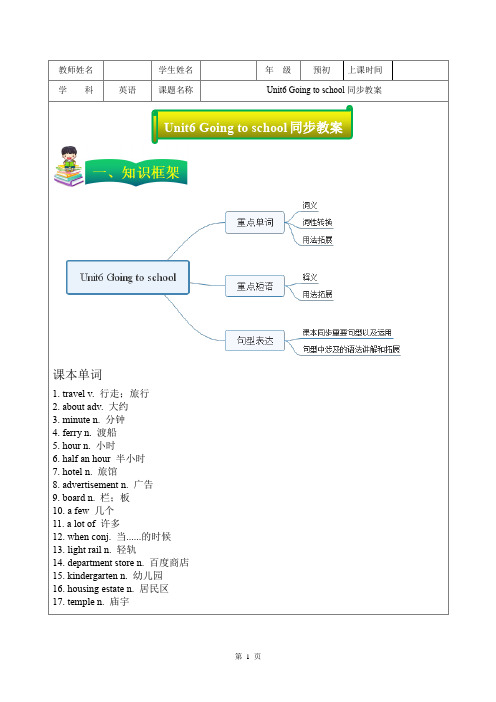
Unit6 Going to school同步教案课本单词1. travel v. 行走;旅行2. about adv. 大约3. minute n. 分钟4. ferry n. 渡船5. hour n. 小时6. half an hour 半小时7. hotel n. 旅馆8. advertisement n. 广告9. board n. 栏;板10. a few 几个11. a lot of 许多12. when conj. 当......的时候13. light rail n. 轻轨14. department store n. 百度商店15. kindergarten n. 幼儿园16. housing estate n. 居民区17. temple n. 庙宇I. Important words and phrases:Words:1. travelv. 行走,旅行Do you like travelling, Mary? 玛丽,你喜欢旅行吗?n. 旅行-What's this book about? 这本书是关于什么的?-It’s about travel. 是关于旅游的。
【记忆链接】traveller n.旅行者;旅客。
例如:【友情提示]】在美式英语中,travel的过去式,过去分词traveled, 现在分词travelling.在英式英语中,travel的过去式,过去分词travelled, 现在分词travelling.2. aboutadv. 大约prep. 关于-What's the film about?这部电影是关于什么的?-It’s about the environment. 是关于环境的。
3. minuten. (1)分钟(2)片刻,一会儿ten minute’s walk = a ten-minute walk 十分钟的路程4. ferry n. 渡船5. h our n.小时hour虽然首字母h不为元音字母,但因其首音标为/a/,所以一小时要说成:an hour.half an hour半小时【注意】a/an的区分是根据单词的首字母音素来确定,而不是音标,元音音素的字母可以编成一个口诀:Mr. Li has one fox.6. hotel n. 旅馆stay at/ in a hotel住旅馆7. advertisement n. 广告advertise v.做广告advertiser n.广告商8. board n. 栏;板drawing board 制图板chess board 棋盘noticeboard布告板blackboard黑板9. a lot of+ cn./ un. 许多,大量的plenty of+ cn./ un. 大量的,许多10. whenconj. (1)当……时候It was raining when we arrived. 我们到的时候正在下雨。
牛津英语上海版六年级 6A Unit 6教案设计(4课时,含教后感)

分析期中考卷,订正错误Module 2 Places and activitiesUnit 6Going to schoolFirst periodTeaching aims:Talking about means of transportTalking about distances and time taken travellingLanguage focus:Using propositions to indicate placesUsing How questions to find out specific informationLearning: It takes sb. some time to do sth.Teaching procedures:Pre-task preparation:1. Look and say:First, speak out the means of transport. Read one by one.Then T asks: How do you come to school every day?I come to school on foot/ by bus/ tram/ underground/ car/ ferry/ taxi/ minibus/ bike2. Think and say:S1: Do you live near or far away from school?S2: I live near school. /I live far away from school.While-task procedure:1. Look and learn:Leave home 07:00 Get to school 07:25It takes me about 25 minutes to get to school. get to 到达= arrive in /at板书句式:It takes sb. some time to do sth. Ss read one by one.Leave home 07:05 Get to school 07:15It takes me about 10 minutes to get to school.Leave home 07:30 Get to school 08:00It takes me about thirty minutes / half an hour to get to school.Practise: How long does it take you to get to school?It takes me about …to get to school.2. Look and read:Read the text after the tape, sentence by sentence.Ss read by themselves, individual Ss read.强调第三人称单复数动词的变化以及宾格的变化。
沪教版六年级英语第一学期:Unit6 Going to school 课件(共23张PPT)

underground.
It takes him about an hour to get there.
Century Park
25 mins
15 mins
10 mins
Jill goes to Century Park by bus, then by ferry, then by
bus.
It takes her about fifty minutes to get there.
Look and say
10 mins
5 mins
It takes me about fifteen minutes to get to the supermarket.
10 mins
50 mins
Xujiahui
It takes me about an hour to get to Xujiahui.
Mary goes to Shanghai Railway Station by bus. It takes her about 45 minutes to get there.
Judy and Alice go to Shanghai Railway Station by bicycle. It takes them about half an hour to get there.
15 mins 20 mins
5 mins
Nanjing Road
Kitty and Alice go to Nanjing Road by bus, then by underground, then on foot. It takes them about forty minutes to get there.
六年级英语上册Unit6《Goingtoschool》教案牛津上海版(一起)(最新整理)
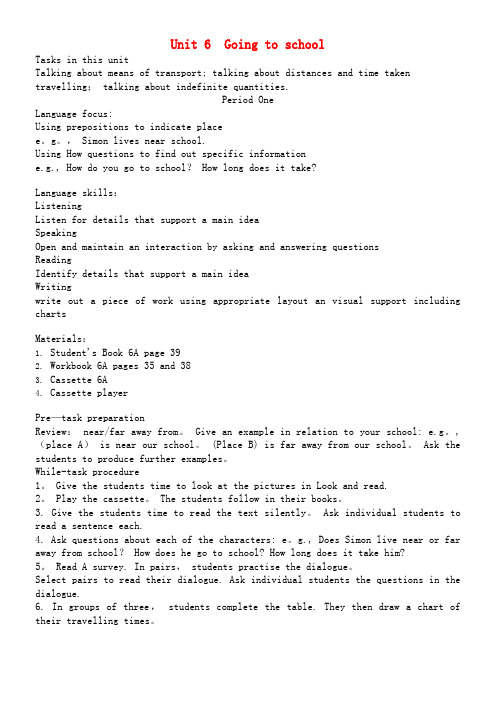
Unit 6 Going to schoolTasks in this unitTalking about means of transport; talking about distances and time taken travelling; talking about indefinite quantities.Period OneLanguage focus:Using prepositions to indicate placee。
g。
, Simon lives near school.Using How questions to find out specific informatione.g., How do you go to school? How long does it take?Language skills:ListeningListen for details that support a main ideaSpeakingOpen and maintain an interaction by asking and answering questionsReadingIdentify details that support a main ideaWritingwrite out a piece of work using appropriate layout an visual support including chartsMaterials:1.Student's Book 6A page 392.Workbook 6A pages 35 and 383.Cassette 6A4.Cassette playerPre—task preparationReview: near/far away from。
Give an example in relation to your school: e.g。
小学英语六年级上册(牛津上海版) Unit6 going to school 知识点总结
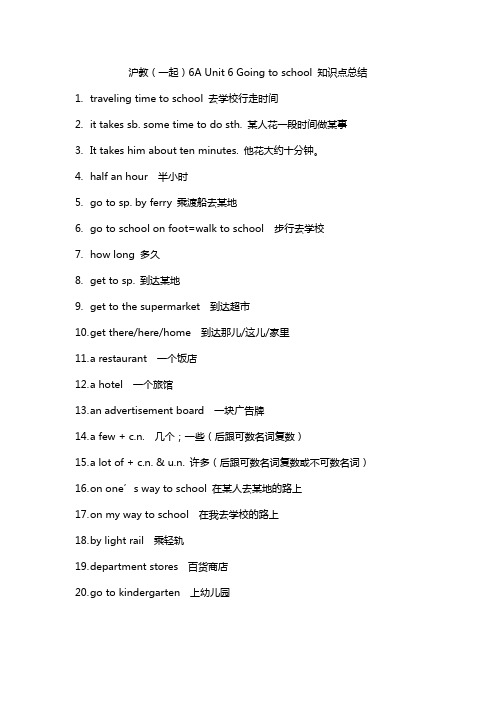
沪教(一起)6A Unit 6 Going to school 知识点总结1.traveling time to school 去学校行走时间2.it takes sb. some time to do sth. 某人花一段时间做某事3.It takes him about ten minutes. 他花大约十分钟。
4.half an hour 半小时5.go to sp. by ferry 乘渡船去某地6.go to school on foot=walk to school 步行去学校7.how long 多久8.get to sp. 到达某地9.get to the supermarket 到达超市10.g et there/here/home 到达那儿/这儿/家里11.a restaurant 一个饭店12.a hotel 一个旅馆13.a n advertisement board 一块广告牌14.a few + c.n. 几个;一些(后跟可数名词复数)15.a lot of + c.n. & u.n. 许多(后跟可数名词复数或不可数名词)16.o n one’s way to school 在某人去某地的路上17.o n my way to school 在我去学校的路上18.b y light rail 乘轻轨19.d epartment stores 百货商店20.g o to kindergarten 上幼儿园语言点1. near 离…很近后面直接接地点I live near school.=My home is near school.我家离学校很近。
2. far away from=far from离…很远He lives far away from school.=His home is far from school.他家离学校很远3.by bus/bike/car/underground/train/ferry动词短语:take a bus/bike/car/underground/train/ferry ride a bikeHe goes to school by bus.=He takes a bus to school.4. on foot 动词:walkShe goes to work on foot every day.=She walks to work every day.5. It takes sb. some time to do sth. 花费某人多少时间做某事。
2017-2018学年六年级英语上册牛津上海版(一起)课件:Unit 6 Going to school 2

• • • • •
Near Rose Garden Road. Where is Rose Garden School? On foot, then by underground, then by bus, then on foot (again). How does Joe go to school? At Prince Underground Station. Where does he get off the underground? At Rose Garden Road. Where does he get off the bus? About 40 minutes. How long does it take Joe to get to school?
Gold Mine
Option 1 Option 2 Option 3
Listen and match
Listen and write
Look ቤተ መጻሕፍቲ ባይዱnd learn
a restaurant
a hotel
an advertisement board
Look and read
My name’s Simon. I go to school by bus, then on foot. I see some restaurants, a few shops and a lot of people when I’m on the bus.
• Complete the route description about Joe’s journey to school.
Joe leaves home at seven o’clock in the morning. He goes to the nearest underground station on foot five minutes __________________________________. It takes him about _______________ twenty minutes to get there. Then he gets on the underground. He sits on it for ______________ Prince Underground Station Then he gets on ______________ a bus and gets off at ________________________. and sits on it for _________________. Finally, he gets off the bus at ten minutes Rose Garden Road on foot _______________________ and goes to school ______________ for ________________. Totally, it takes _______________ five minutes forty minutes to get to school.
小学英语六年级上册(牛津上海版) Unit6 going to school 知识点总结

沪教(一起)6A Unit 6 Going to school 知识点总结1.traveling time to school 去学校行走时间2.it takes sb. some time to do sth. 某人花一段时间做某事3.It takes him about ten minutes. 他花大约十分钟。
4.half an hour 半小时5.go to sp. by ferry 乘渡船去某地6.go to school on foot=walk to school 步行去学校7.how long 多久8.get to sp. 到达某地9.get to the supermarket 到达超市10.g et there/here/home 到达那儿/这儿/家里11.a restaurant 一个饭店12.a hotel 一个旅馆13.a n advertisement board 一块广告牌14.a few + c.n. 几个;一些(后跟可数名词复数)15.a lot of + c.n. & u.n. 许多(后跟可数名词复数或不可数名词)16.o n one’s way to school 在某人去某地的路上17.o n my way to school 在我去学校的路上18.b y light rail 乘轻轨19.d epartment stores 百货商店20.g o to kindergarten 上幼儿园语言点1. near 离…很近后面直接接地点I live near school.=My home is near school.我家离学校很近。
2. far away from=far from离…很远He lives far away from school.=His home is far from school.他家离学校很远3.by bus/bike/car/underground/train/ferry动词短语:take a bus/bike/car/underground/train/ferry ride a bikeHe goes to school by bus.=He takes a bus to school.4. on foot 动词:walkShe goes to work on foot every day.=She walks to work every day.5. It takes sb. some time to do sth. 花费某人多少时间做某事。
六年级英语上册Unit6Goingtoschool课件1牛津上海版(一

I sit on the underground for about twenty minutes. Then I get off the underground at Prince Underground Station. Then I get on
I sit on the bus for ten minutes. Then I get off the bus at
walking to school? S2: I see a lot of/some/a few ____ when I am…
• How does Joe go to schoothl?en by bus, then on foot (again).
• Where does he get off the underground?
At Prince Underground Station.
• Where does he get off the buAst?Rose Garden Road. • How long does it take Joe to get to school?
Module 2
Places and activities
Unit 6
Going to school
Joe’s journey to school
I go to the nearest underground station on foot. It takes me about five minutes.
I walk to Rose Garden School. It takes me another five minutes.
10 mins 5 mins
5 mins
20 mins
六年级英语上册 Unit 6《Going to school》教案 牛津上海版(一起)

Unit 6 Going to schoolTasks in this unitTalking about means of transport; talking about distances and time taken travelling; talking about indefinite quantities.Period OneLanguage focus:Using prepositions to indicate placee.g., Simon lives near school.Using How questions to find out specific informatione.g., How do you go to school? How long does it take?Language skills:ListeningListen for details that support a main ideaSpeakingOpen and maintain an interaction by asking and answering questionsReadingIdentify details that support a main ideaWritingwrite out a piece of work using appropriate layout an visual support including chartsMaterials:1.Student’s Book 6A page 392.Workbook 6A pages 35 and 383.Cassette 6A4.Cassette playerPre-task preparationReview: near/far away from. Give an example in relation to your school: e.g., (place A) is near our school. (Place B) is far away from our school. Ask the students to produce further examples.While-task procedure1. Give the students time to look at the pictures in Look and read.2. Play the cassette. The students follow in their books.3. Give the students time to read the text silently. Ask individual students to read a sentence each.4. Ask questions about each of the characters: e.g., Does Simon live near or far away from school? How does he go to school? How long does it take him?5. Read A survey. In pairs, students practise the dialogue.Select pairs to read their dialogue. Ask individual students the questions in the dialogue.6. In groups of three, students complete the table. They then draw a chart of their travelling times.7.Workbook 6A page 38a Give the students time to read the page.b Play the cassette. The students listen and write.c Select individual students to read out their sentences.Consolidation:Workbook 6a page 35Period TwoLanguage focus:Asking How questions to find out the length of a period of timee.g., Mum, how long does it take you to get to the supermarket?Using noun phrases to indicate timee.g. It takes me about ten minutes to get there.Language skills:ListeningListen for specific informationSpeakingOpen and maintain an interaction by asking and answering questionsReadingRead written language in meaningful chunksWritingGather and share information by using strategies such as questioning and interviewing.Materials:1.Student’s Book 6A page 402.Workbook 6A pages 36, 39, and 413.Cassette 6A4.Cassette playerPre-task preparationWrite some places known to the students on the board: e.g., park, supermarket, post office, library. Ask: e.g., How long does it take you to get to the park? to elicit: e.g., It takes me10 minutes.While-task procedure1 Play the cassette for Listen and say. The students repeat.2 In pairs, students practise the dialogues. Select pairs to read a dialogue.3 Ask questions about the dialogues: e.g., How long does it take Kitty's mum to get to the supermarket? to elicit: It takes her about 10 minutes to get there.4 In pairs, students practise Ask and answer with the places in the list. Select pairs to say a dialogue.S Give the students time to look at Ask and report. Ask the students to calculate times for their family and relatives and complete the table. They then make a report in class.Post-task activitiesWorkbook 6A page 41 (for more able students)a The students complete the table about six family members.b The students then write the report. Ask individual students to read a sentence from their report.ConsolidationWorkbook 6A page 36 and 39Period ThreeLanguage focus:Using connectives to show the time relationship between two actionse.g., I see… when I ‘m walking to school.Using determiners to indicate indefinite quantitiese.g., I see some restaurants, a few shops and a lot of people when I’m on the bus.Language skills:ListeningUnderstand the connection between ideas by recognizing linking words.SpeakingOpen and maintain an interaction by asking and answering questionsReadingRecognize format and language features when reading non-narrative textsWritingIdentify details that support a main ideaMaterials:1.Student’s Book 6A page 412.Workbook 6A pages 373.Cassette 6A4.Cassette playerPre-task preparationReview/Introduce: a lot of, some, a few. Demonstrate using examples in the classroom: e.g., There are a lot of books in the classroom. There are some posters. There are a few picture: Ask the students to produce further examples.Play the cassette for Look and learn. The students repeat.While-task procedure1. Give the students time to look at the pictures in Look and read.2. Play the cassette. The students listen. Ask individual students to read a sentence each.3. Ask questions: e.g., How does Simon go to school? What does he see when he is on the bus/walking to school?4. In pairs, students continue practising in Look, ask at answer.5.Ask individual students: How do you go to school? What do you see when you are on the bus/walking to school?ConsolidationWorkbook 6A pages 37 Period FourLanguage focus:Using connectives to show the time relationship between two actionse.g., What do you see when you are walking to school?Language skills:ListeningListening for specific informationSpeakingMaintain an interaction by replyingReadingRead written language in meaningful chunksWritingGather and share information by using strategies such as questioning and interviewing. Materials:1.Student’s Book 6A page 422.Workbook 6A page 40Pre-task preparationReview transport. Say: How do you go to school? to elicit: I go by bus., etc. List the means of transport on the board.While-task procedure1 Give the students time to read Ask and answer. Ask the students to say the words. Go round the class.2 Ask one or two students the questions in Ask and answer. In pairs, students continue the practice.3 Ask other students the questions.4 Read Draw and write. You may ask the students to write their answers on page 40 of the Workbook. Post-task activitiesWorkbook 6A page 40a In pairs, students discuss the questions and write some sentences about their journey to school.b The students draw two pictures of the things they see on their way to school.c Select individual students to show their pictures and read out the sentences.ConsolidationCopy the new wordsRecite the passage.。
上海牛津版(试用本)六年级英语上册unit6、Going、to、school课件3

/z/
advertisement boards
gardens factories police stations swimming pools
grass shops temples offices banks parks markets
Memory Game
A: I see trees when I’m on the bus.
parks
hotels
swimming pools
markets
/s/ /ts/ /iz/ /z/
trees
/s/
supermarkets
schools
department stores
/ts/
restaurants
kindergartens
/iz/
hotels
flowers
housing estates
B: I see trees and shops when I’m on the
bus.
C: I see trees, shops and gardens when I’m
on the bus.
D:… E:… F:… G:…
• In pairs, talk about what you see on your way to school.
in the housing estate
in the Ocean Park irkbook 6A, pages 40 and 41
•Copy the new words
Welcome to Hannah’s class!
ferry light rail
temple
kindergarten
an advertisement board
六年级英语上册Unit6Goingtoschool4牛津上海版(一起)精品 课件

7.far away from school离学校远 8.by ferry 乘轮渡
Jill lives _f_a_r__a_w_a_y__f_r_o_m__ school. She goes to school ___b_y__f_e_r_r_y_____. It takes her about _f_o_r_t_y_m__i_n_u_t_e_s__.
10.leave homLeook and learn
离开家
11.get to =
/ li:v/
leave
arrive at到达
/ ə'raɪv /
home:
get to
school:
It takes me about twenty-five minutes to get to school.
/ /
Look and Learn
25. few / a few + 可数名词 little / a little + 不可数名词
a few / a little 为肯定含义,“一些”、“一点”
few / little 为否定含义,“几乎没有”
27.the amoLuonokt aonfdtLimearen时间(量)
/ bɔ:d/
Look and read
My name’s Simon. 24.I go to school by bus, then on foot.
I see some restaurants, a few shops /fju:/ and a lot of people when I’m on the bus.
9.half an hour = thirty minutes
六年级英语上册(牛津上海版) Unit6 going to school 知识点总结

沪教(一起)6A Unit 6 Going to school 知识点总结1.traveling time to school 去学校行走时间2.it takes sb. some time to do sth. 某人花一段时间做某事3.It takes him about ten minutes. 他花大约十分钟。
4.half an hour 半小时5.go to sp. by ferry 乘渡船去某地6.go to school on foot=walk to school 步行去学校7.how long 多久8.get to sp. 到达某地9.get to the supermarket 到达超市10.g et there/here/home 到达那儿/这儿/家里11.a restaurant 一个饭店12.a hotel 一个旅馆13.a n advertisement board 一块广告牌14.a few + c.n. 几个;一些(后跟可数名词复数)15.a lot of + c.n. & u.n. 许多(后跟可数名词复数或不可数名词)16.o n one’s way to school 在某人去某地的路上17.o n my way to school 在我去学校的路上18.b y light rail 乘轻轨19.d epartment stores 百货商店20.g o to kindergarten 上幼儿园语言点1. near 离…很近后面直接接地点I live near school.=My home is near school.我家离学校很近。
2. far away from=far from离…很远He lives far away from school.=His home is far from school.他家离学校很远3.by bus/bike/car/underground/train/ferry动词短语:take a bus/bike/car/underground/train/ferry ride a bikeHe goes to school by bus.=He takes a bus to school.4. on foot 动词:walkShe goes to work on foot every day.=She walks to work every day.5. It takes sb. some time to do sth. 花费某人多少时间做某事。
- 1、下载文档前请自行甄别文档内容的完整性,平台不提供额外的编辑、内容补充、找答案等附加服务。
- 2、"仅部分预览"的文档,不可在线预览部分如存在完整性等问题,可反馈申请退款(可完整预览的文档不适用该条件!)。
- 3、如文档侵犯您的权益,请联系客服反馈,我们会尽快为您处理(人工客服工作时间:9:00-18:30)。
S2: I go to school by ____, then … S1: What do you see when you are on the bus? walking to school? S2: I see a lot of/some/a few ____ when I am…
I see a few parents, some teachers and a lot of students when I’m walking to school.
• In pairs, talk about what you sees on your way to school.
S1: How do you go to school?
I sit on the underground for about twenty minutes. Then I get off the underground at Prince Underground Station. Then I get on
I sit on the bus for ten minutes. Then I get off the bus at
For about 40 minutes.
Near Rose Garden Road.
What can you see when you are on your way to school?
an advertisement board
a restaurant
a hotel
a post office
I walk to Rose Garden School. It takes me another five minutes.
5 mins 5 mins 10 mins
20 mins
• • • • •
Where is Rose Garden School? On foot, then by underground, then by bus, then on foot How does Joe go to school? (again). Where does he get off the underground? At Prince Underground Station. Where does he get off the bus? At Rose Garden Road. How long does it take Joe to get to school?
Module 2
Places and activities
Unit 6
Going to school
Joe’s journey to school
I go to the nearest underground station on foot. It takes me about five minutes.
a food market
a kindergarten
Hale Waihona Puke Look and read
My name’s Simon. I go to school by bus, then on foot. I see some restaurants, a few shops and a lot of people when I’m on the bus.
